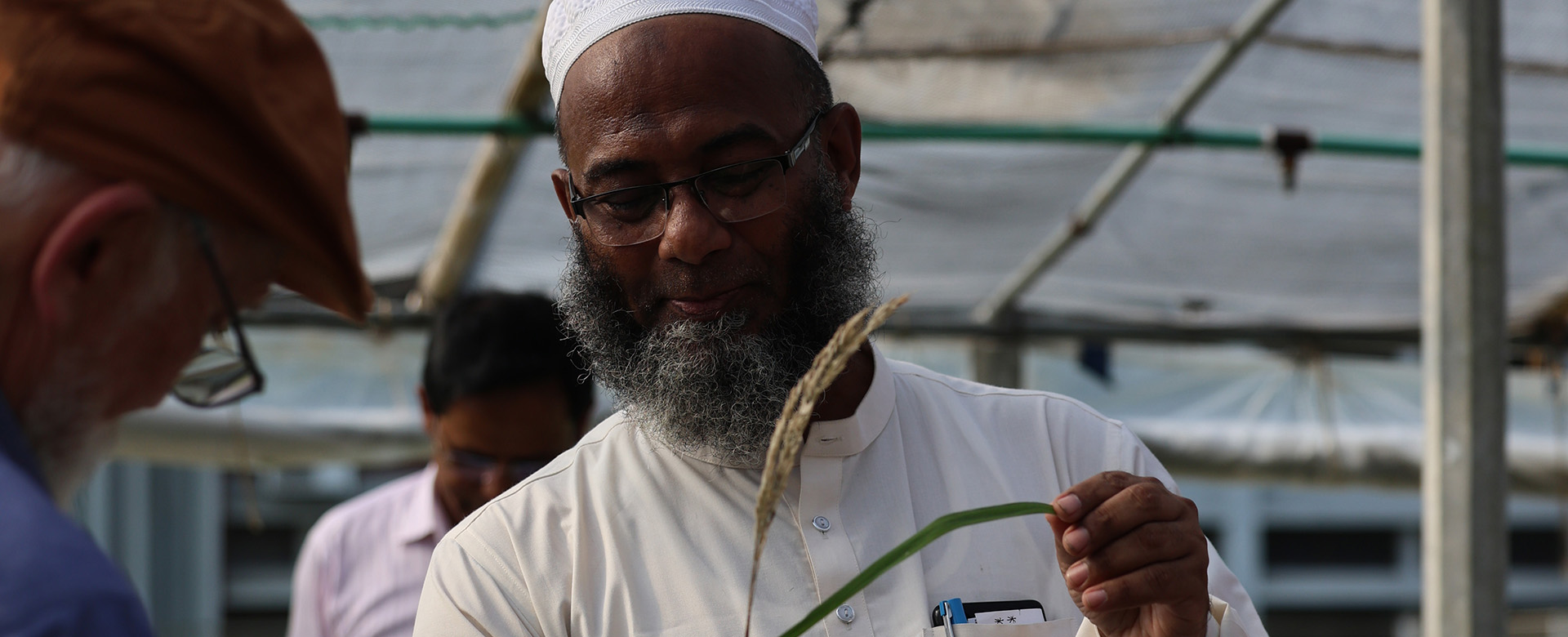
About
Overview
CRCIL invests in research to identify, validate and transfer alleles that control key traits, thereby increasing the resilience of wheat, sorghum, millet and rice in the face of abiotic and biotic stressors like drought, flooding, temperature extremes, salinity and pathogens.
CRCIL utilizes new breeding tools and methods to facilitate faster, lower-cost and more effective generation of cereal germplasm, addressing changing growing conditions and increasing demand for these key cereal crops.
Through its United States government-funded work, CRCIL aims to help double the world’s food supply by 2050 by improving the world’s key food security crops—wheat, sorghum, millet and rice—grown in the United States and worldwide.
CRCIL’s activities make the United States safer, stronger and more prosperous by focusing on ambitious, upstream science for developing superior wheat, sorghum, millet and rice varieties.
CRCIL connects global research partners in Senegal, Ethiopia, Bangladesh and the United States to tackle some of the most pressing challenges in cereal research. This international collaboration enhances field and environmental research capabilities, advancing critical technologies and resources to benefit farmers and researchers worldwide.
Leveraging decades of effort in strengthening the crop breeding capacity of National Agriculture Research Institutes (NARIs), CRCIL is well-positioned to deliver on its ambitious objectives.
CRCIL’s global research partners collaborate with experts to conduct research activities focused on germplasm enhancement. NARIs also provide critical regional and institutional knowledge for the implementation of projects.
By identifying, validating and transferring novel alleles for cereal crops, CRCIL is expanding the genetic toolkit of traits to draw from when developing new varieties of vital cereal crops that are more drought-, heat-, and disease-tolerant. This effort leads to increased profitability for U.S. producers worldwide and expands global economic opportunities.
Our Mission
CRCIL’s mission is to advance global upstream climate-resilient cereal breeding systems, fully harnessing the benefits of cutting-edge agricultural science and technology to serve the needs of the Climate Resilient Cereal Strategic Framework and the broader community.
CRCIL’s vision is to provide food, nutrition and economic security to target countries while generating spill-over benefits for U.S. farmers and industry by developing climate-resilient cereals tailored to local environments, markets, needs and preferences.
CRCIL will advance these goals through scientific inquiry, appropriate partnerships, and scaling mechanisms. Research and associated capacity strengthening ensure a continuing pipeline of improved technologies, practices and knowledge, leading to greater profits, reduced poverty, food security and enhanced resilience for smallholder farmers.
The work will directly impact the Global Food Security Strategy (GFSS) goals of ending global hunger, malnutrition and poverty while creating a safer international environment for U.S. interests. It will strengthen international and U.S. farming systems through technological innovation, leading to more prosperous agricultural systems. Strong agricultural production helps provide more economic stability worldwide.
Our Strategic Research Partners
CRCIL has strategic partnerships in Bangladesh, Ethiopia and Senegal. These research partners are part of an integrated global team, taking a multi-country approach to help the United States expand field and environmental research capabilities to address changes in growing conditions and biotic stresses to cereal crops.
Bangladesh is home to approximately 165 million people and is one of the most densely populated countries, with a population density of 1,165 people per square kilometer. The country is estimated to be one of the most vulnerable to climate change due to its location, topographical and geographical features, as well as high natural resource utilization and exploitation.
Cropping utilization tops 200 percent across Bangladesh, with at least two yearly cropping seasons. Agriculture, especially rice production, is affected by salinity, flash flooding and inundation, heat, drought and biotic stresses like rice blast.
Rice productivity in Bangladesh will need to double by 2030, yet production continues to face worsening climatic stresses. The Bangladesh Rice Research Institute (BRRI), CRCIL’s local partner, is one of the strongest rice breeding programs in the region. Their capacity has been substantially enhanced through breeding projects over the past decade, including the Transforming Rice Breeding project, which is supported by the Bill and Melinda Gates Foundation.
In Ethiopia, agriculture accounts for nearly 75 percent of employment and almost 40 percent of the gross domestic product. However, drought is a major concern for Ethiopia’s 123 million people, particularly for smallholder farmers who manage more than 90 percent of the arable land.
The Ethiopian government has prioritized wheat as the most important crop for improvement and production through 2030. Additionally, Ethiopia is the center of origin and diversity for sorghum, providing strategic alignment with two of CRCIL’s focus crops.
The Ethiopian Institute of Agricultural Research (EIAR) has outlined several objectives to advance agricultural innovation and climate adaptation, particularly in terms of drought tolerance in wheat and sorghum, and has a strong interest in collaboration to drive forward the enhancement of climate-resilient germplasm.
CRCIL aims to build on previous research successes and investments in Ethiopia, including the Sorghum and Millet Innovation Lab and the Bill and Melinda Gates Foundation's Modernizing Ethiopian Research on Crop Improvement (MERCI) initiative.
Most of Senegal lies in the Sahel region, a warm, arid, and semi-arid tropics with poor soils that stretches across Africa, serving as a transition between the Sahara Desert to the north and the savannas to the south. Around 70 percent of Senegal’s estimated 18.9 million people are employed in the agriculture and livestock sector.
Senegal was chosen as a CRCIL target country for the West Africa Region because all four target crops—millet, rice, sorghum, and wheat—are grown there, providing the country with versatility and the bandwidth to handle germplasm enhancement across multiple geographical zones and different ecosystems.
The Senegalese Institute for Agricultural Research (ISRA) and the Regional Center for the Study of Heat and Drought Adaptation (CERAAS) have collaborated with international partners to address common challenges and develop solutions to complex crop production issues. Building on past achievements, ISRA-CERAAS is a focal point for crop improvement in West Africa.